Showing 1–5 of 10 results
-
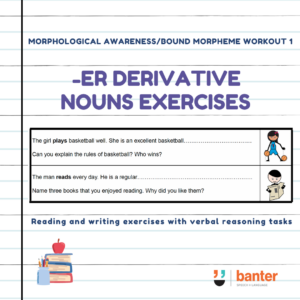
$5.99 including GST
In these exercises, we focus on -er added to verbs to form derivative nouns like “farmer”, “builder” and “painter”. -er words like these are called “derivative nouns” because the -er noun derives (or comes from) the verb to which -er is added.
With 80 example sentences, these no-prep exercises are designed to provide students with lots of practice reading and writing derivative nouns in a short period of time while also working on a variety of sentence structures. To extend students, we also include 80 additional questions related to the derivative nouns that require verbal reasoning skills.
-
Sale!
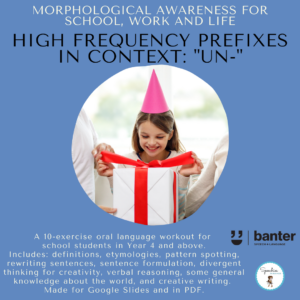
$6.99 Original price was: $6.99.$0.00Current price is: $0.00. including GST
In this 19-page resource, we teach students that the prefix “un-” means “not” or the “opposite of”.
It contains 10 activities designed to teach and consolidate this knowledge. Activities include:
-
- teaching the definition and etymology of the prefix, “un-”, for comprehension and spelling;
- a procedural word learning writing activity;
- auditory bombardment -listening to “un-” words in sentence context;
- a highlighting activity: spotting the prefix in sentences;
- a sentence rewriting exercise requiring students to replace words with a word using the “un-” prefix;
- a sentence formulation exercise with semantic constraints: making original sentences using words with an “un-” prefix;
- a divergent naming exercise: creative thinking using words with “un-” prefixes;
- a general knowledge investigation;
- a verbal reasoning/persuasive writing exercise: generating pros and cons for arguments including “un-” words; and
- a story-making exercise with “un-” words.
This resource is one of nine modules covering the most frequent prefixes uses in English. Fully scripted, the module is is suitable for one-to-one, small group and whole class instruction; and can be downloaded in PDF and Google Slides format.
-
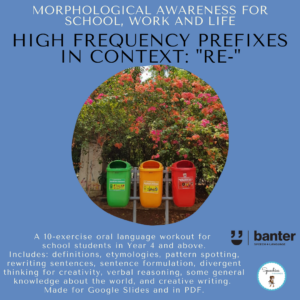
$6.99 including GST
In this 19-page resource, we teach students that the prefix “re-” means “back”, “again” or “undoing”.
It contains 10 activities designed to teach and consolidate this knowledge. Activities include:
- teaching the definition and etymology of the prefix, “re-”, for comprehension and spelling;
- a procedural word learning writing activity;
- auditory bombardment – listening to “re-” words in sentence context;
- a highlighting activity: spotting the prefix in sentences;
- a sentence rewriting exercise requiring students to replace words with a word using the “re-” prefix;
- a sentence formulation exercise with semantic constraints: making original sentences using words with an “re-” prefix;
- a divergent naming exercise: creative thinking using words with “re-” prefixes;
- a general knowledge investigation;
- a verbal reasoning/persuasive writing exercise: generating pros and cons for arguments including “re-” words; and
- a story-making exercise with “re-” words.
This resource is one of nine modules covering the most frequent prefixes uses in English. Fully scripted, the module is is suitable for one-to-one, small group and whole class instruction; and can be downloaded in PDF and Google Slides format.
-
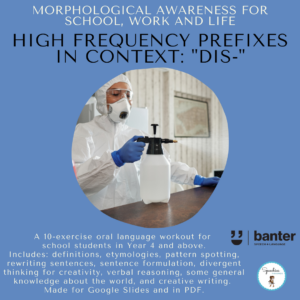
$6.99 including GST
In this 19-page resource, we teach students that the prefix “dis-” means “lack of”, “opposite” and “apart, away”.
It contains 10 activities designed to teach and consolidate this knowledge. Activities include:
- teaching the definition and etymology of the prefix, “dis-”, for comprehension and spelling;
- a procedural word learning writing activity;
- auditory bombardment – listening to “dis-” words in sentence context;
- a highlighting activity: spotting the prefix in sentences;
- a sentence rewriting exercise requiring students to replace words with a word using the “dis-” prefix;
- a sentence formulation exercise with semantic constraints: making original sentences using words with a “dis-” prefix;
- a divergent naming exercise: creative thinking using words with “dis-” prefixes;
- a general knowledge investigation;
- a verbal reasoning/persuasive writing exercise: generating pros and cons for arguments including “dis-” words; and
- a story-making exercise with “dis-” words.
This resource is one of nine modules covering the most frequent prefixes uses in English. Fully scripted, the module is is suitable for one-to-one, small group and whole class instruction; and can be downloaded in PDF and Google Slides format.
-
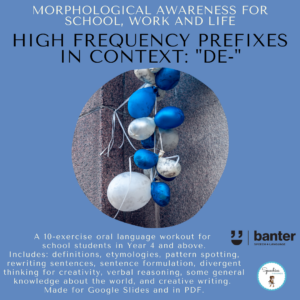
$6.99 including GST
In this 19-page resource, we teach students that the prefix “de-” means “down” or “down from”.
It contains 10 activities designed to teach and consolidate this knowledge. Activities include:
- teaching the definition and etymology of the prefix, “de-”, for comprehension and spelling;
- a procedural word learning writing activity;
- auditory bombardment – listening to “de-” words in sentence context;
- a highlighting activity: spotting the prefix in sentences;
- a sentence rewriting exercise requiring students to replace words with a word using the “de-” prefix;
- a sentence formulation exercise with semantic constraints: making original sentences using words with a “de-” prefix;
- a divergent naming exercise: creative thinking using words with “de-” prefixes;
- a general knowledge investigation;
- a verbal reasoning/persuasive writing exercise: generating pros and cons for arguments including “de-” words; and
- a story-making exercise with “de-” words.
This resource is one of nine modules covering the most frequent prefixes uses in English. Fully scripted, the module is is suitable for one-to-one, small group and whole class instruction; and can be downloaded in PDF and Google Slides format.





